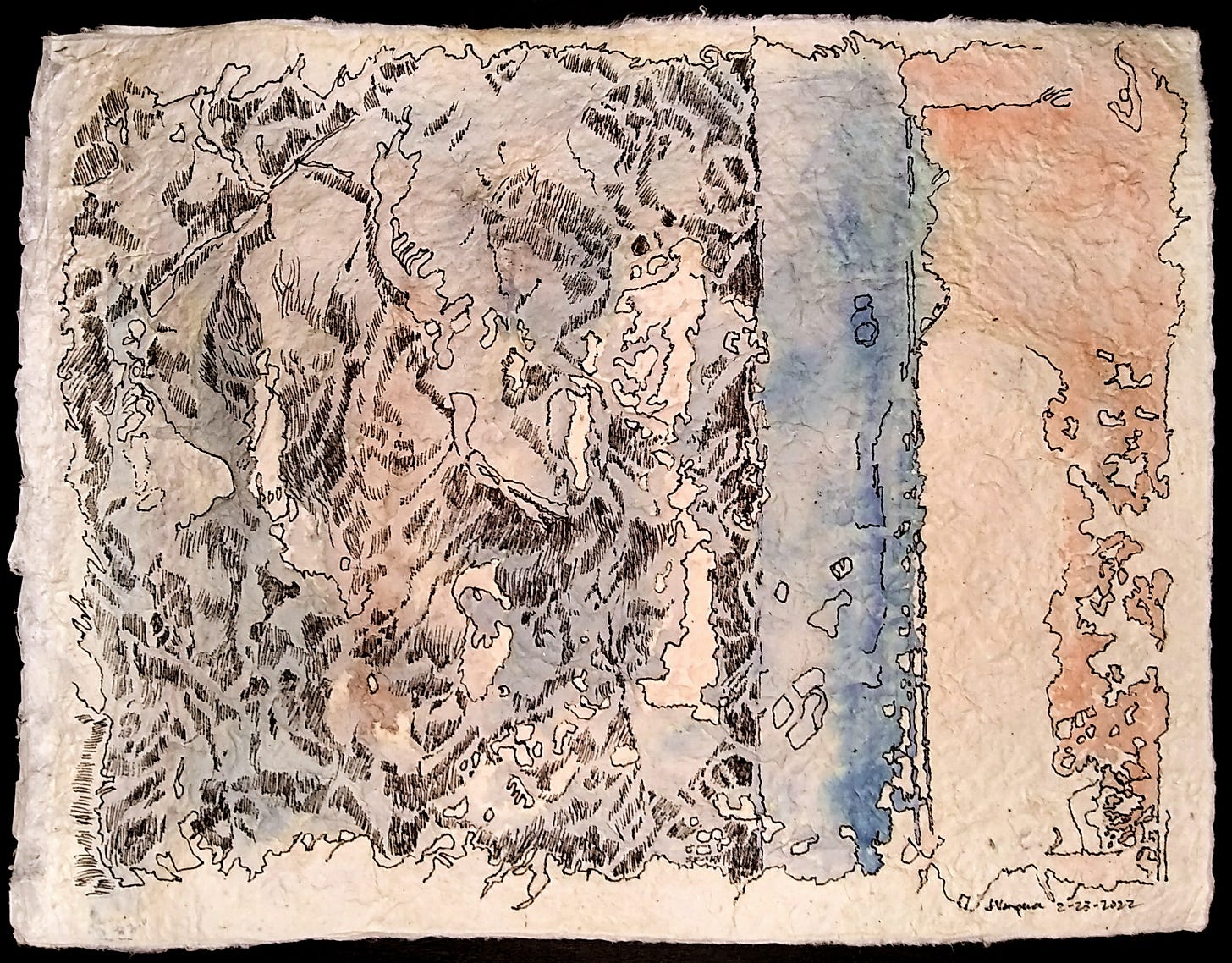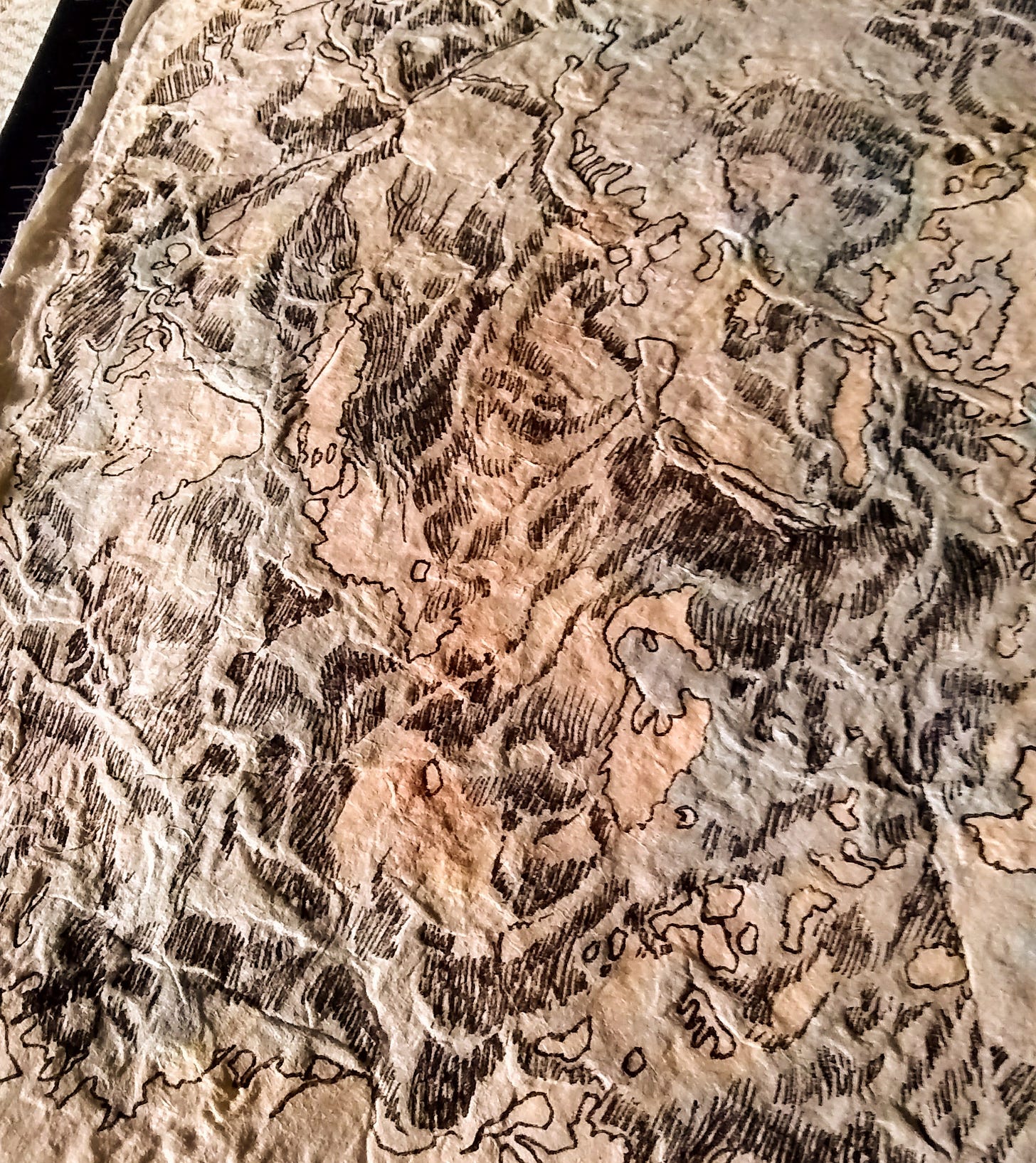2/26/2022 #53
Here and Now, Writing, Lokta Paper, Bryan Collier on David Drake, Makshya Tolbert, Storm Reyes, Timothy Snyder, Anil Dash, Zoë Keating, Judith Hill w/Michiko Hill.
HERE AND NOW
I’m still swamped with work. Here are a few fragment-thoughts from the past week:
Sunday: the day after my “break” and right after a meditation session. After a number of warm days, today is chilly, and the sound that reaches my ears is that of crows calling.
Monday: Today’s tea taste is Genmaicha, an everyday, workaday sort of green tea, mixed with roasted rice grains and teensy popcorn puffs, which give it a nice umami taste. Actually, there’s a more refined version of this, with high quality matcha. I’ve got some of that, too.
Tuesday night: we had some rain (yay)! Just a little, but we’re expecting more tonight. Nothing like the sound of those raindrops hitting the roof and stirring up the scent of damp earth and leaves.
Thursday: I’ve been thinking about ways to occasionally (or even regularly) bring other voices into the Outpost. I would like to write a set of questions to pose to other writers and artists—get firsthand reports on their creative lives and processes in this changing world. Six (questions) seems like a good number; I’m working on it. If you have any thoughts/ideas about this, let me know!
Saturday: The reports from Ukraine are on my mind—how could they not be? But I also wonder what’s happening with all those other desperate migrants and refugees —still waiting to cross borders, waiting for housing, waiting for help. I’ve been feeling very tired of nations, nation-states, borders, territories, and the tragedies that take place at, or on the way to, these “lines” drawn in the dirt.
[NOTE: I recently posted a discussion between a Russian and an American writer in this space. Given the latest news I’ve heard today about Russia, I’ve decided to delete it as a protective measure for one of the writers.]
WRITING
Right. There’s that project with my parent’s letters. The first thing I should be doing is setting up an excel sheet and listing all the letters by date, place, to and from, etc. And then I need to scan the letters, because if I lose them, I’ll really be pissed at myself. Oh, and I have to get a scanner.
Pause . . .
Maybe we get older and sense [regret] a gap in our knowledge about a parent, grandparent, or sibling. Maybe they told us, or gave us clues, but we weren’t listening, didn’t think it was important. We get older, they’re gone, and there’s nothing left; or we are left with fragments, objects, letters or photographs, but don’t quite know how to unravel this, where to begin. That’s where I’m at. There seems to be a question, here. I guess the answer is to just begin— somewhere.
ART
I ordered and received some beautiful Lokta deckle-edge paper from the Kathmandu Valley Co. in Nepal. Lokta paper is made out of the evergreen Lokta bush, and the paper has a lot of character. When you apply watercolor (which you have to do carefully, because it soaks through), the paper puckers up slightly when dry, creating beautiful, organically formed ridges—perfect for my usual experimental approach, where I often allow the texture of the paper, its ridges and indentations, to dictate how I draw over its surface.
Still, I imagine that other artists would have a problem with those ridges. Also, the company calls this paper “cardstock,” but it doesn’t resemble any card stock I’ve ever seen. It’s a soft paper with a very uneven surface. There’s a limited “range” of things you can do with the paper, and the thickness of each sheet is inconsistent; some sheets are fairly thick, while others in the same package are thin and fragile. This is the first time I’ve used this type of paper. I may try a sample from another company, to compare the quality.

I’m not a Luddite (I own a digital drawing tablet), but there’s something beautiful, and even precious about the tactile feel of handmade paper, the dribble of ink, and the viscosity of paint as it flows from a paint brush onto a surface. While drawing on this paper with my pen, I can’t help but think of mountains, valleys, and rivers, as well as the plant and plant fibers that make up this sheet of paper.
LINKS
Bryan Collier tells the story of David Drake, the enslaved potter who made over 40,000 pots:
“Becoming Water: Black Memory in Slavery’s Afterlives,” an essay by Makshya Tolbert.
The Bookmobile: an animated short film narrated by Storm Reyes (StoryCorps):
“A Few Ways to Help Ukrainians,” from Timothy D. Snyder’s “Thinking About…” Substack newsletter (Snyder is an internationally recognized scholar and author on Eastern Europe, the Soviet Union, and Ukraine):
Considering NFTs? Well, consider again: “NFTs Weren’t Supposed to End Like This,” an article by Anil Dash in Atlantic (2020).
SOUNDINGS
Zoë Keating performing “Possible” live, at King’s Place, 2019:
Judith Hill sings “Gypsy Lover,” with her mom, Michiko Hill, on keyboards:
Extra: Judith and her hair!
Until next week . . .







They really do look like topographic maps.